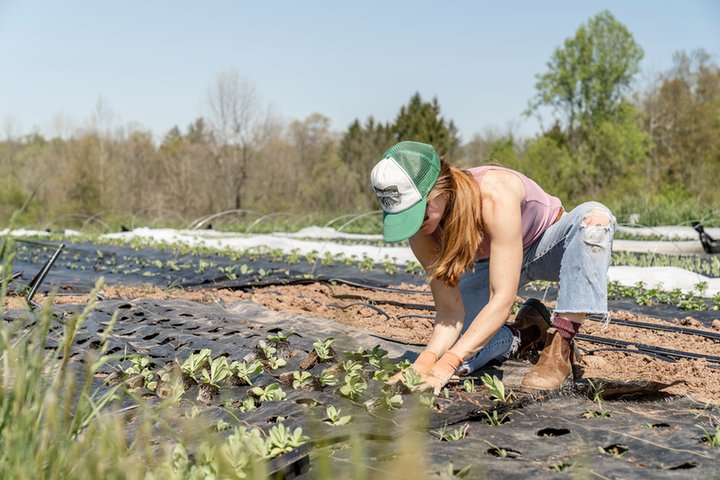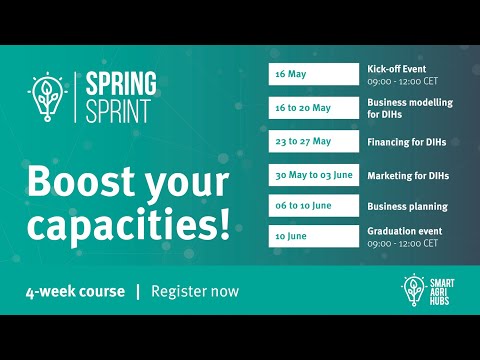Lesson Learnt on Business development

Wageningen Economic Research
The context of the Success Story
Developing and implementing Digital Technology is not only a technological challenge, but also requires the support of social sciences and humanities on the business and social implications.
The core of the Success Story
In the period 2017-2020, Wageningen Economic Research supported a set of 33 Use cases in the Iof2020 project in developing viable business models and finding the way in the complex issue of data sharing.
Why is it a Success Story?
The use cases were primarily driven by private sector companies, in the first phases, these companies didn't like to be supported on business and ethical issues. At the end of the project, most of them were very happy and mentioned the support helped them to overcome tricky issues.
The best examples of demonstrating the Success Story
Want to see what the IoF2020 project and the different trials are all about? Then check out the use case demonstrations for a look behind the scenes.
Instituto Tecnológico de Aragón (ITAINNOVA)
The context of the Success Story
Approved PREPARE project (ongoing): "Facilitating SMEs access to digital technologies for stock and logistics management optimization"
Digital technologies are widespread among larger businesses to optimize stock management and logistics processes, with impressive results in reducing costs and carbon footprint of operations. In the agri-food sector, by its nature, the optimization of these processes is critical. However, SMEs are lagging way behind, not only in the adoption of technology but also in the change of their mindset. Digital technologies feel far and inaccessible for many, and decision-making in these areas is rarely data-driven.
Aragón DIH (from ITAINNOVA) developed an AI-based tool (Kajal) that can improve SME competitiveness by addressing forecasting, replenishment and logistics planning, all critical aspects for production planning, cost management and customer success. Sostenibles DIH (Sostenibles Network) is a digital network with +150 SME members in the organic agri-food sector in Spain.
With support from RESPOND Open Call, developed a digital tool to facilitate SMEs' access to the market, currently serving 50 SMEs nationwide.
The consortium aims at preparing a project to facilitate the adoption of digital tools for stock and logistics management optimization among SMEs in Spain.
The core of the Success Story
Our broad experience in AGRO IT projects, as some ongoing ones:
Why is it a Success Story?
On the technology side, the consortium will conduct a technical assessment on the requirements to adapt the tool Kajal developed by ITAINNOVA to the use-case scenarios of SMEs; as well as the feasibility of integrating the tool in the IE Market sostenibles.
On the user side, the consortium will conduct user research to identify SMEs' needs, use-cases, business impact, and potential bottlenecks in technology adoption. The research will help refine the needs assessment and requirements to adapt the tool, and it will inform the preliminary selection of SMEs willing to participate in the IE.
Supporting consumer behaviour
A prototype traceability service of the QUHOMA solution, developed by FINT, is targeted at the Greek market. By scanning a QR code of the final product, consumers can see the entire history through a digital record of practices and business events.
While all sensor data is aggregated and accessible via an external industry-trusted interface (EPCIS), the main goal is to inform the consumer about how operations are controlled. In an earlier chapter, we talked about the implementation of GS1 standards. To succeed in that, the researchers teamed up with another IoF2020 use case: Meat Transparency and Traceability. It developed a tool which supports certification bodies in carrying out audits. While the meat use case is focused on the audits of the entire value chain, this use case aims at telling the story of a product. Therefore, they transform their IoT platform into a marketing tool for farmers as it gives them the chance to show the customers how the raw material is handled and transformed into a consumable product. By modelling upstream (planting to harvest) traceability events and delivering them through a standard interface, farmers have more data and information to capitalise on. Trust in their environmental sensitivity and quality of products is then enhanced. In these regards, the added value for the value chain is increased along with the revenues and profits, and it is re-distributed where it matters most: on the producer side. Ultimately, the technology would support food safety principles and give consumers the chance to share information on social media. Through this, they want to initiate a shift in consumer behaviour and bring them closer to the product and the producer. As this paradigm shift is slowly getting underway, as studies on consumer behaviour showed, the solution of this use case has not gone unnoticed by other stakeholders. Currently, two big retailers are looking into the service as it could support their supply chain management and auditors.
Certification enhancing trust
Adapting to the varying types of wineries, local differences and regional datasets, as well as particular production methods was the initial challenge for Matteo Balderacchi, the Use Case Coordinator, and his team.
To address this challenge, several tools were explored and combined: a software able to interoperate between official datasets (from the Ministry or Regional Governments) and the software used by the certification body; specific sensors from WINEGRID, using LoRa (long-range) networks or Wi-Fi connection, is deployed on each testing site across Italy to monitor the fermentation process. From a technical point of view, the solution facilitates compliance with certification standards by liaising the production philosophies and practices of the winemakers with their clients through the certification seal.
In this vein, the use case team developed a standardised software to facilitate transparency in agriculture and boost efficiency by connecting all the sources of information describing and guaranteeing the supply chain. By using digital tools for auditing, the use of paper is reduced while making the entire certification process faster and more efficient because human errors are reduced significantly. This ultimately also increases the quality of wines, which unequivocally has the most appeal to consumers and wine enthusiasts alike. Another advantage this use case offers to consumers is the virtual tour of the winery. The team embraces augmented reality solutions from UQIDO to successfully bridge the gap between winemakers and consumers while making the latter more aware of the different production processes. Something of special interest during Covid-19 restrictions.
About the "Lessons" page from SmartAgriHubs
A bit more than a year ago, SmartAgriHubs open a new page on the Innovation Portal dedicated to the lessons learnt by its community. Today there are more than 110 articles from various member of our community sharing their experiences, so others can learn from their success or mistakes!
SmartAgriHubs is a huge network of Digital Innovation Hubs, and with its Innovation Portal it gathers more than 800 organisations. All together, we can support each other to mature faster and better! The digitalisation and digitisation of European Agriculture represents a huge challenge as various factors threaten the agricultural production. So why wasting time making all the same mistakes and learning the hard way?
SmartAgriHubs Spring Sprint
Congratulations to the SmartAgriHubs Spring Sprint Laureates 2022!
To boost DIHs capacity, SmartAgriHubs created a special training. Looking for more details in business development, financing, or marketing? You name it, we have it!
This spring, we also brought the training to a new level with interactive sessions and special guests to support the participants during their learning. From 16 May until 10 June, more than 10 DIHs participated in the SAH Spring Sprint and met weekly to discuss the training and share their experience in a real peer-to-peer approach.
Click on the image to watch the recording of the Kick-Off Event!
The Spring Sprint started with a Kick-Off meeting and a fruitful exchange on the future of capacity building for DIHs with the participation of Project Officer Doris Marquart (European Commission, DG AGRI), and ended with a Graduation Ceremony!
Did you miss the Spring Sprint? Do not worry, the learning materials will be added to the SmartAgriHubs Library this summer!
You can also check our YouTube channel to find more content related to DIHs capacity building.
the Magnitude
of smartagrihubs 2/2
To succeed in business, it is important to build strong expertise in project development and management. Read some Lessons from the SmartAgriHubs ecosystem and discover the Capacity Building training offered by SAH!


